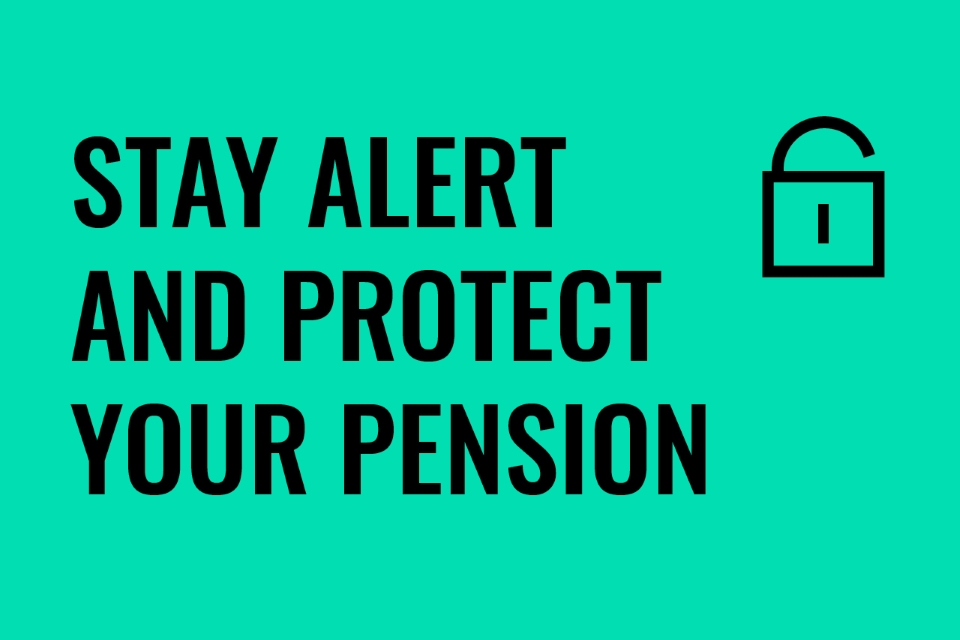
Avoid pension scams
How to protect yourself from pension fraud
It’s a sad reality that pension scams are on the rise in the UK. In the first five months of 2021 alone, over £2.2 million was reported lost to pension fraud.
Fraudsters are becoming more sophisticated. It’s never been more important to stay vigilant and aware of any potential scams.
Below are some top tips and resources to help you stay financially safe and protect your pension savings.
What is a pension scam?
A pension scam is a form of fraudulent activity which aims to take money from someone’s pension. Pension scams come in all shapes a sizes, but the most common include pension liberation, pension investment, pension review and pension advice scams.
Pension liberation scam
What they offer:
- The ability to take money from your pension before 55
The aims:
- To cash in a pension and move it to an unauthorised account
- To charge a high fee meaning you’d only receive some of the money that you withdraw
Not only could you lose the money you instruct to take out, these types of scams can also lead to huge tax bills. You could face a tax charge of 55% as a penalty for taking money early.
Pension investment scam
What they offer:
- High investment returns on pension investments
The aims:
- To transfer a pension to an unauthorised account
- To transfer the pension and then invest it into scam investments
These types of scams often offer unrealistic investment returns, which are sometimes framed as overseas investments.
Pension review scam
What they offer:
- A ‘free’ review of your pension and investments
The aims:
- To gather information about your pension to authorise a transfer to an unauthorised account
- To transfer the pension to an authorised account which leads to another type of scam e.g. scam investments
Be particularly wary of this type of scam as you approach retirement.
Pension advice scam
What they offer:
- ‘Free’ pension advice
The aims:
- To gather information about your pension to authorise a transfer to an unauthorised account
- To transfer the pension to an authorised account which leads to another type of scam e.g. scam investments
If you’re aged 55-64, you’re more likely to be targeted with this type of scam. Be careful and stay alert as you near retirement age.
How to spot a pension scam
Spotting a scam isn’t always easy, but there are some tell-tale signs you can watch out for.
- It’s unexpected – scammers often cold-call their victims. But they can also get in touch by email, text message, post, social media or even word of mouth. The Pensions Regulator stresses that any unexpected contact is a major red flag, but especially if they ask you to transfer your pension.
- You feel under pressure – you might be told you have a limited time to act. Or that you’ll miss out on a bonus or discount if you don’t act before a certain date. You should always take time to consider your options and never rush your decision.
- Promise of unrealistic returns – to tempt you in, scammers often promise impressive or guaranteed returns. They’ll even play down the risks. If it sounds too good to be true, it often is.
- You’re offered an incentive – scammers might incentivise you to make a transfer. This includes any bonuses, loans, or a limited time investment offer.
- The company isn’t authorised – if someone contacts you about financial advice, (this could be advice on a pension transfer or where to invest your pension) they must have FCA permission. You can check if a company has permission using the FCA register. More details on this below.
- Out of the ordinary claims – most financial products, including pensions, must meet certain rules and regulations. Scammers might use these rules to bend truths and lure you in. For example, it’s true that you can access a pension before 55, but only generally if you’re in ill health.
The Pension Regulator also highlights some other warning signs which could indicate a scam. These include:
-
If the pension scheme allows high risk or unregulated
investments. The FCA has underlined general examples which may help you
to identify a high-risk investment:
- Investments that promise significant returns at a point in the future
- Investments that would only normally be offered to high-net worth, sophisticated or professional investors
- Investments that are unconventional or abstract
- If the pension scheme charges are unclear or high. This can include paying several charges to associated parties which together add up to an excessive amount.
- If the pension scheme’s investment structure is complex and unclear. Or if overseas investments are included.
If you come across any of these signs, you should seek guidance from MoneyHelper.
Tips to help you avoid pension scams

Don’t be scared to cut off contact
Scammers might come across as charming and friendly, but that’s all part of their ruse. You don’t always have to be the nice guy, if someone is pressuring you then don’t be scared to terminate contact. This could be as simple as not returning emails or even putting down the phone. You can then report any cold calls or messages to the Information Commissioner’s Office.


Double check if the company contacting you is genuine
The FCA authorises most financial service firms in the UK. If the company contacting you isn’t authorised, it could be a scam. You can check the Financial Services Register to see if a firm or individual is authorised or registered.
If you can’t find any contact details on the FCA Register, or if the firm claims they’re out of date, check by calling the consumer helpline on 0800 111 6768.
If you’re dealing with an overseas company, you should check with the regulator in that country and check the scam warnings from foreign regulators.
Double check if company contacting you is genuine
The FCA authorises most financial service firms in the UK. If the company contacting you isn’t authorised, it could be a scam. You can check the Financial Services Register to see if a firm or individual is authorised or registered.
If you can’t find any contact details on the FCA Register, or if the firm claims they’re out of date, check by calling the consumer helpline on 0800 111 6768.
If you’re dealing with an overseas company, you should check with the regulator in that country and check the scam warnings from foreign regulators.
Check the FCA warning list
Use the FCA Warning List to see if the company is known to be operating without the FCA’s permission. This won’t account for all active scams, as scammers change their names and details regularly, but it’s a starting point.
Helpful resources
Emotional support
Falling victim to fraud can have a huge emotional impact. Victims can often feel embarrassed and don’t want to tell people what’s happened, even though they’re not to blame.
If you need to talk to someone about how you’re feeling, you can contact Victim Support either online or via their support line on 0808 1689111. You can also contact The Samaritans at any time of the day or night on 116 123.
Financial support
If a scam has left you struggling financially, you can contact Citizens Advice to help you find a way forward.
You can speak to an adviser through its national phone service, Adviceline, on 03444 111 444, which is available from 9am - 5pm Monday to Friday.
HL Security Centre
Our Security Centre keeps you updated with the threats and issues that might affect you and your accounts.
We also explain some of the measures we take to help keep your details safe.
Getting guidance
You should consider seeking guidance before changing pension providers or taking money from your pension. This can help to protect you against scams.
MoneyHelper provides free independent and impartial information and guidance. If you’re over 50 and have a defined contribution pension, Pension Wise also offers appointments to talk through the ways to take money from your pension.

How to report pension fraud
If you’ve been defrauded or experienced cybercrime you should report it to Action Fraud either online or by calling 0300 123 2040.
If you've started a pension transfer and now suspect a scam, call your pension provider straight away. They might be able to stop it.
You should also report what’s happened to the FCA either online or by calling 0800 111 6768.
If you have an HL account and you’ve noticed any suspicious activity or think your account might’ve been compromised, then contact our Online Support team on 0117 980 9984 as soon as possible.